A Report on Decision-Making Models and Ethical Considerations in Firms
VerifiedAdded on 2023/06/13
|7
|2062
|265
Report
AI Summary
This report critically analyzes decision-making processes within organizations, focusing on three key models: rational, bounded rationality, and intuition. It examines how these models are applied in formulating organizational policies and procedures, with a strong emphasis on ethical considerations. A case study of the Fair Work Ombudsman is included to illustrate ethical decision-making in practice. The report offers recommendations for mitigating unethical decision-making, such as recognizing common pitfalls, resisting unethical requests, and leading ethically. The conclusion emphasizes the importance of selecting appropriate decision-making strategies and fostering ethical behavior within organizations. This document is available on Desklib, a platform that provides students with a wealth of academic resources, including past papers and solved assignments.
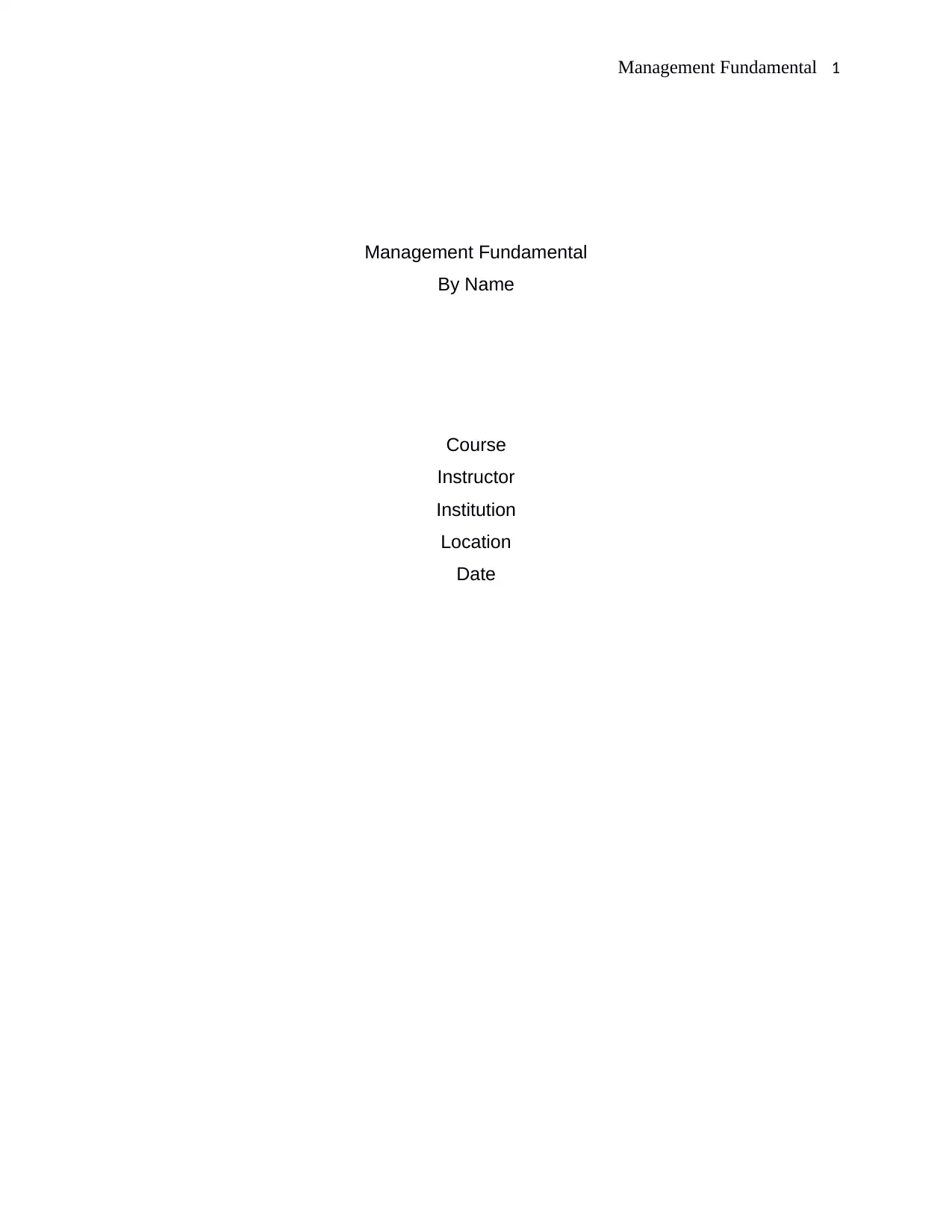
Management Fundamental 1
Management Fundamental
By Name
Course
Instructor
Institution
Location
Date
Management Fundamental
By Name
Course
Instructor
Institution
Location
Date
Paraphrase This Document
Need a fresh take? Get an instant paraphrase of this document with our AI Paraphraser
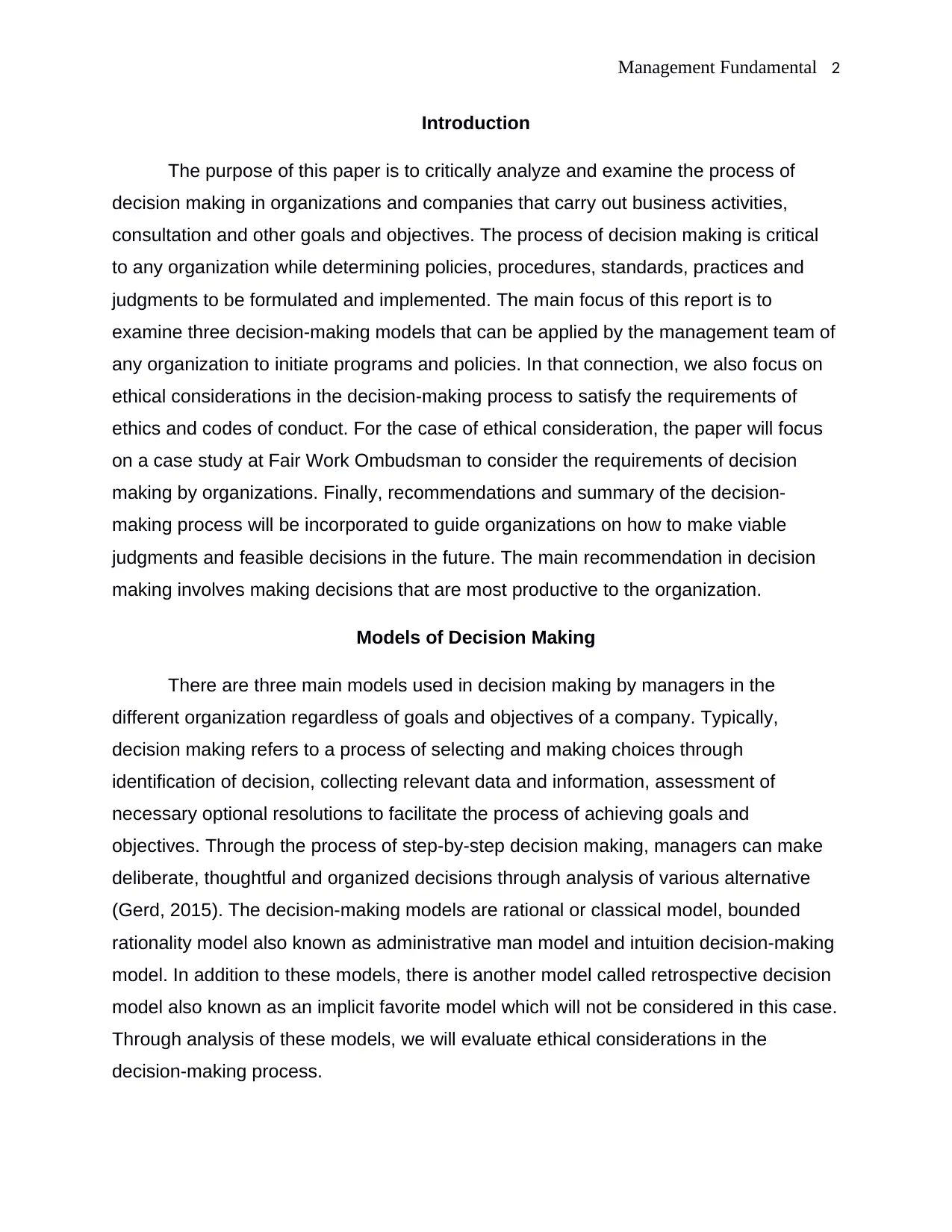
Management Fundamental 2
Introduction
The purpose of this paper is to critically analyze and examine the process of
decision making in organizations and companies that carry out business activities,
consultation and other goals and objectives. The process of decision making is critical
to any organization while determining policies, procedures, standards, practices and
judgments to be formulated and implemented. The main focus of this report is to
examine three decision-making models that can be applied by the management team of
any organization to initiate programs and policies. In that connection, we also focus on
ethical considerations in the decision-making process to satisfy the requirements of
ethics and codes of conduct. For the case of ethical consideration, the paper will focus
on a case study at Fair Work Ombudsman to consider the requirements of decision
making by organizations. Finally, recommendations and summary of the decision-
making process will be incorporated to guide organizations on how to make viable
judgments and feasible decisions in the future. The main recommendation in decision
making involves making decisions that are most productive to the organization.
Models of Decision Making
There are three main models used in decision making by managers in the
different organization regardless of goals and objectives of a company. Typically,
decision making refers to a process of selecting and making choices through
identification of decision, collecting relevant data and information, assessment of
necessary optional resolutions to facilitate the process of achieving goals and
objectives. Through the process of step-by-step decision making, managers can make
deliberate, thoughtful and organized decisions through analysis of various alternative
(Gerd, 2015). The decision-making models are rational or classical model, bounded
rationality model also known as administrative man model and intuition decision-making
model. In addition to these models, there is another model called retrospective decision
model also known as an implicit favorite model which will not be considered in this case.
Through analysis of these models, we will evaluate ethical considerations in the
decision-making process.
Introduction
The purpose of this paper is to critically analyze and examine the process of
decision making in organizations and companies that carry out business activities,
consultation and other goals and objectives. The process of decision making is critical
to any organization while determining policies, procedures, standards, practices and
judgments to be formulated and implemented. The main focus of this report is to
examine three decision-making models that can be applied by the management team of
any organization to initiate programs and policies. In that connection, we also focus on
ethical considerations in the decision-making process to satisfy the requirements of
ethics and codes of conduct. For the case of ethical consideration, the paper will focus
on a case study at Fair Work Ombudsman to consider the requirements of decision
making by organizations. Finally, recommendations and summary of the decision-
making process will be incorporated to guide organizations on how to make viable
judgments and feasible decisions in the future. The main recommendation in decision
making involves making decisions that are most productive to the organization.
Models of Decision Making
There are three main models used in decision making by managers in the
different organization regardless of goals and objectives of a company. Typically,
decision making refers to a process of selecting and making choices through
identification of decision, collecting relevant data and information, assessment of
necessary optional resolutions to facilitate the process of achieving goals and
objectives. Through the process of step-by-step decision making, managers can make
deliberate, thoughtful and organized decisions through analysis of various alternative
(Gerd, 2015). The decision-making models are rational or classical model, bounded
rationality model also known as administrative man model and intuition decision-making
model. In addition to these models, there is another model called retrospective decision
model also known as an implicit favorite model which will not be considered in this case.
Through analysis of these models, we will evaluate ethical considerations in the
decision-making process.
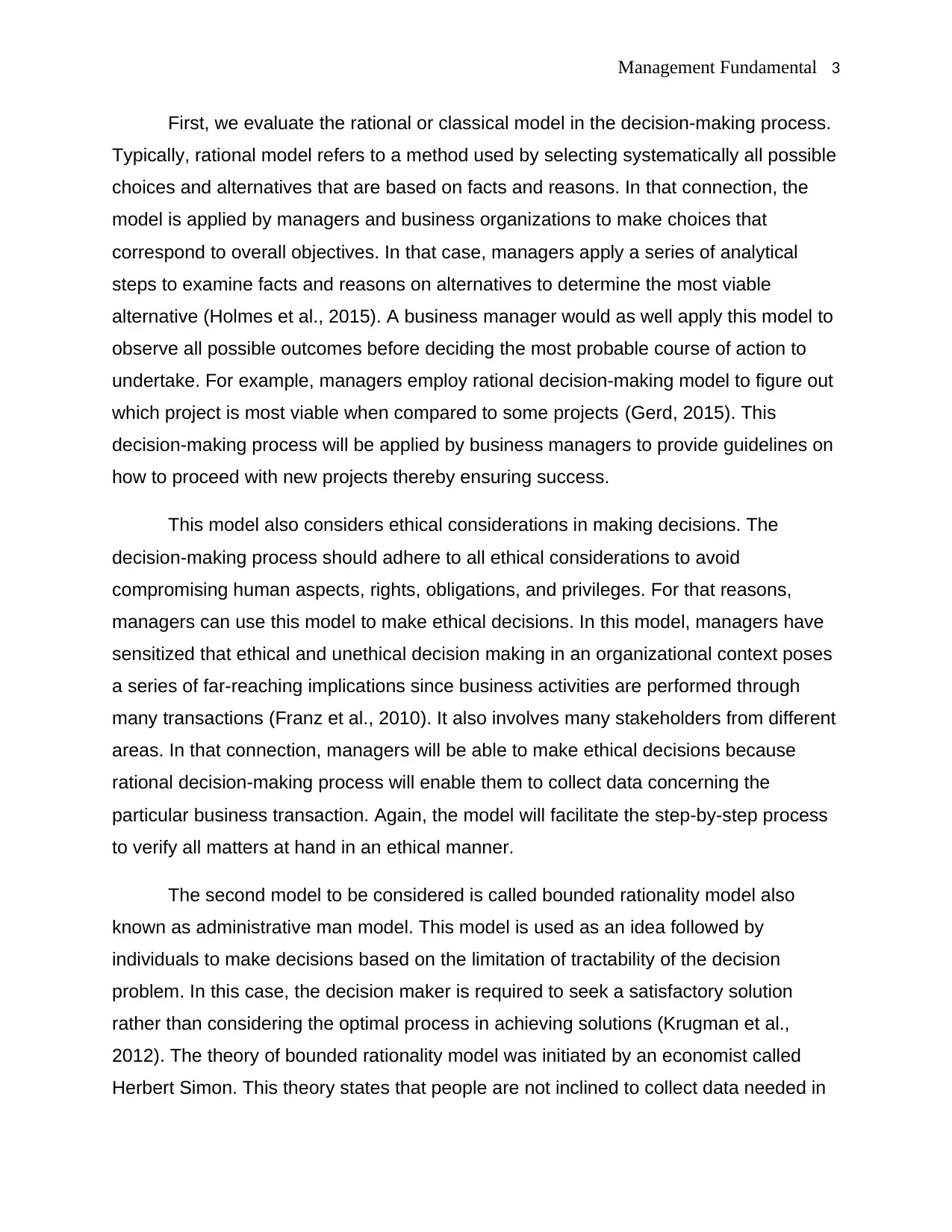
Management Fundamental 3
First, we evaluate the rational or classical model in the decision-making process.
Typically, rational model refers to a method used by selecting systematically all possible
choices and alternatives that are based on facts and reasons. In that connection, the
model is applied by managers and business organizations to make choices that
correspond to overall objectives. In that case, managers apply a series of analytical
steps to examine facts and reasons on alternatives to determine the most viable
alternative (Holmes et al., 2015). A business manager would as well apply this model to
observe all possible outcomes before deciding the most probable course of action to
undertake. For example, managers employ rational decision-making model to figure out
which project is most viable when compared to some projects (Gerd, 2015). This
decision-making process will be applied by business managers to provide guidelines on
how to proceed with new projects thereby ensuring success.
This model also considers ethical considerations in making decisions. The
decision-making process should adhere to all ethical considerations to avoid
compromising human aspects, rights, obligations, and privileges. For that reasons,
managers can use this model to make ethical decisions. In this model, managers have
sensitized that ethical and unethical decision making in an organizational context poses
a series of far-reaching implications since business activities are performed through
many transactions (Franz et al., 2010). It also involves many stakeholders from different
areas. In that connection, managers will be able to make ethical decisions because
rational decision-making process will enable them to collect data concerning the
particular business transaction. Again, the model will facilitate the step-by-step process
to verify all matters at hand in an ethical manner.
The second model to be considered is called bounded rationality model also
known as administrative man model. This model is used as an idea followed by
individuals to make decisions based on the limitation of tractability of the decision
problem. In this case, the decision maker is required to seek a satisfactory solution
rather than considering the optimal process in achieving solutions (Krugman et al.,
2012). The theory of bounded rationality model was initiated by an economist called
Herbert Simon. This theory states that people are not inclined to collect data needed in
First, we evaluate the rational or classical model in the decision-making process.
Typically, rational model refers to a method used by selecting systematically all possible
choices and alternatives that are based on facts and reasons. In that connection, the
model is applied by managers and business organizations to make choices that
correspond to overall objectives. In that case, managers apply a series of analytical
steps to examine facts and reasons on alternatives to determine the most viable
alternative (Holmes et al., 2015). A business manager would as well apply this model to
observe all possible outcomes before deciding the most probable course of action to
undertake. For example, managers employ rational decision-making model to figure out
which project is most viable when compared to some projects (Gerd, 2015). This
decision-making process will be applied by business managers to provide guidelines on
how to proceed with new projects thereby ensuring success.
This model also considers ethical considerations in making decisions. The
decision-making process should adhere to all ethical considerations to avoid
compromising human aspects, rights, obligations, and privileges. For that reasons,
managers can use this model to make ethical decisions. In this model, managers have
sensitized that ethical and unethical decision making in an organizational context poses
a series of far-reaching implications since business activities are performed through
many transactions (Franz et al., 2010). It also involves many stakeholders from different
areas. In that connection, managers will be able to make ethical decisions because
rational decision-making process will enable them to collect data concerning the
particular business transaction. Again, the model will facilitate the step-by-step process
to verify all matters at hand in an ethical manner.
The second model to be considered is called bounded rationality model also
known as administrative man model. This model is used as an idea followed by
individuals to make decisions based on the limitation of tractability of the decision
problem. In this case, the decision maker is required to seek a satisfactory solution
rather than considering the optimal process in achieving solutions (Krugman et al.,
2012). The theory of bounded rationality model was initiated by an economist called
Herbert Simon. This theory states that people are not inclined to collect data needed in
⊘ This is a preview!⊘
Do you want full access?
Subscribe today to unlock all pages.

Trusted by 1+ million students worldwide
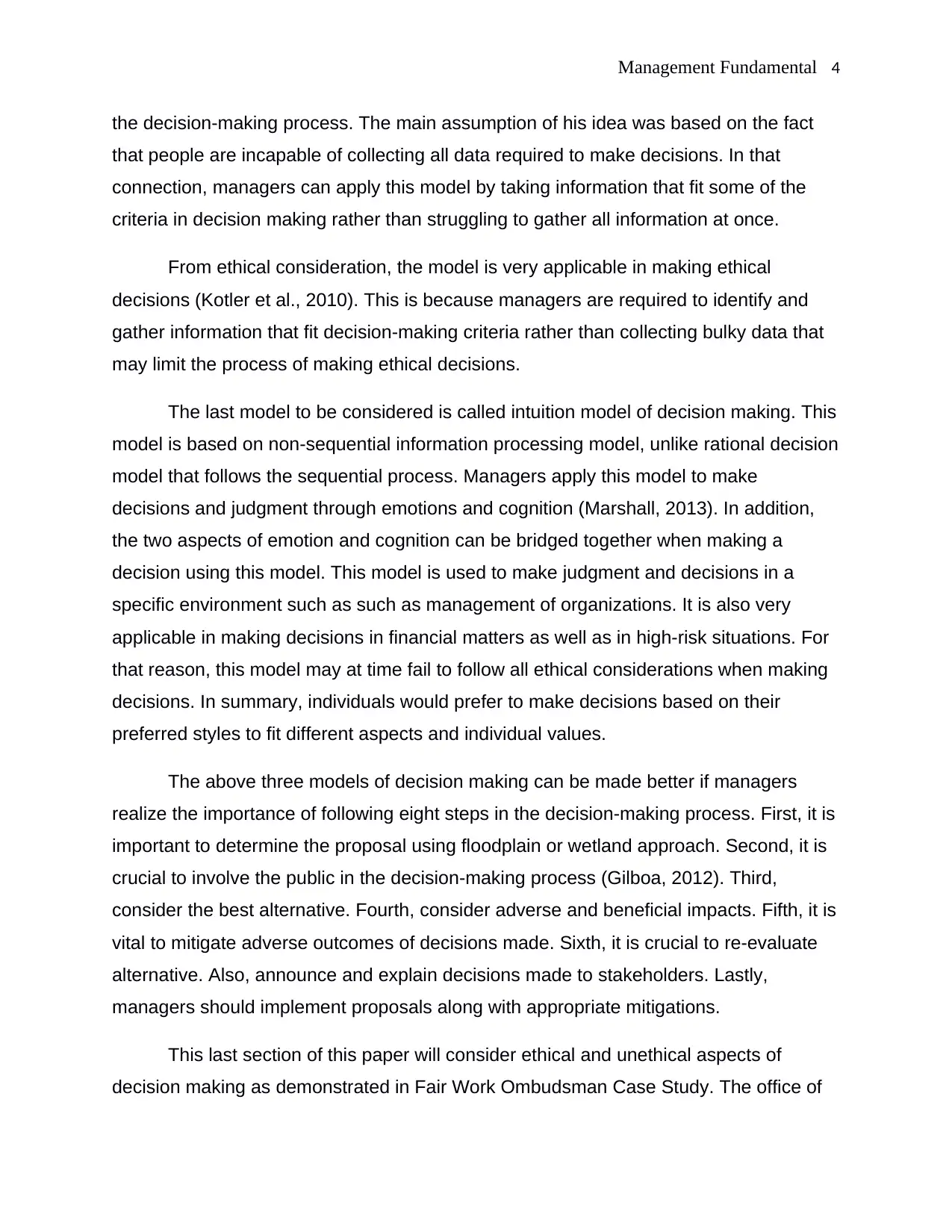
Management Fundamental 4
the decision-making process. The main assumption of his idea was based on the fact
that people are incapable of collecting all data required to make decisions. In that
connection, managers can apply this model by taking information that fit some of the
criteria in decision making rather than struggling to gather all information at once.
From ethical consideration, the model is very applicable in making ethical
decisions (Kotler et al., 2010). This is because managers are required to identify and
gather information that fit decision-making criteria rather than collecting bulky data that
may limit the process of making ethical decisions.
The last model to be considered is called intuition model of decision making. This
model is based on non-sequential information processing model, unlike rational decision
model that follows the sequential process. Managers apply this model to make
decisions and judgment through emotions and cognition (Marshall, 2013). In addition,
the two aspects of emotion and cognition can be bridged together when making a
decision using this model. This model is used to make judgment and decisions in a
specific environment such as such as management of organizations. It is also very
applicable in making decisions in financial matters as well as in high-risk situations. For
that reason, this model may at time fail to follow all ethical considerations when making
decisions. In summary, individuals would prefer to make decisions based on their
preferred styles to fit different aspects and individual values.
The above three models of decision making can be made better if managers
realize the importance of following eight steps in the decision-making process. First, it is
important to determine the proposal using floodplain or wetland approach. Second, it is
crucial to involve the public in the decision-making process (Gilboa, 2012). Third,
consider the best alternative. Fourth, consider adverse and beneficial impacts. Fifth, it is
vital to mitigate adverse outcomes of decisions made. Sixth, it is crucial to re-evaluate
alternative. Also, announce and explain decisions made to stakeholders. Lastly,
managers should implement proposals along with appropriate mitigations.
This last section of this paper will consider ethical and unethical aspects of
decision making as demonstrated in Fair Work Ombudsman Case Study. The office of
the decision-making process. The main assumption of his idea was based on the fact
that people are incapable of collecting all data required to make decisions. In that
connection, managers can apply this model by taking information that fit some of the
criteria in decision making rather than struggling to gather all information at once.
From ethical consideration, the model is very applicable in making ethical
decisions (Kotler et al., 2010). This is because managers are required to identify and
gather information that fit decision-making criteria rather than collecting bulky data that
may limit the process of making ethical decisions.
The last model to be considered is called intuition model of decision making. This
model is based on non-sequential information processing model, unlike rational decision
model that follows the sequential process. Managers apply this model to make
decisions and judgment through emotions and cognition (Marshall, 2013). In addition,
the two aspects of emotion and cognition can be bridged together when making a
decision using this model. This model is used to make judgment and decisions in a
specific environment such as such as management of organizations. It is also very
applicable in making decisions in financial matters as well as in high-risk situations. For
that reason, this model may at time fail to follow all ethical considerations when making
decisions. In summary, individuals would prefer to make decisions based on their
preferred styles to fit different aspects and individual values.
The above three models of decision making can be made better if managers
realize the importance of following eight steps in the decision-making process. First, it is
important to determine the proposal using floodplain or wetland approach. Second, it is
crucial to involve the public in the decision-making process (Gilboa, 2012). Third,
consider the best alternative. Fourth, consider adverse and beneficial impacts. Fifth, it is
vital to mitigate adverse outcomes of decisions made. Sixth, it is crucial to re-evaluate
alternative. Also, announce and explain decisions made to stakeholders. Lastly,
managers should implement proposals along with appropriate mitigations.
This last section of this paper will consider ethical and unethical aspects of
decision making as demonstrated in Fair Work Ombudsman Case Study. The office of
Paraphrase This Document
Need a fresh take? Get an instant paraphrase of this document with our AI Paraphraser
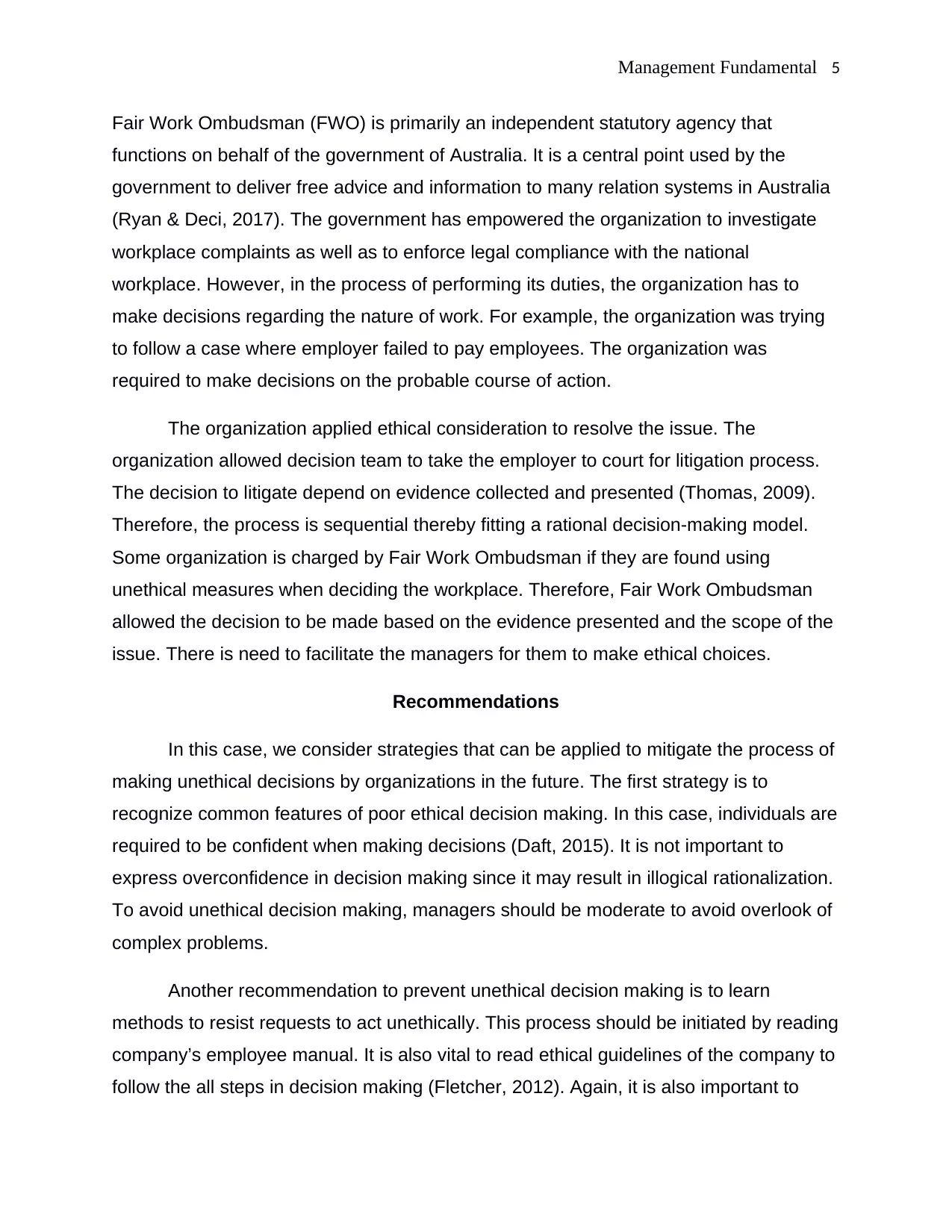
Management Fundamental 5
Fair Work Ombudsman (FWO) is primarily an independent statutory agency that
functions on behalf of the government of Australia. It is a central point used by the
government to deliver free advice and information to many relation systems in Australia
(Ryan & Deci, 2017). The government has empowered the organization to investigate
workplace complaints as well as to enforce legal compliance with the national
workplace. However, in the process of performing its duties, the organization has to
make decisions regarding the nature of work. For example, the organization was trying
to follow a case where employer failed to pay employees. The organization was
required to make decisions on the probable course of action.
The organization applied ethical consideration to resolve the issue. The
organization allowed decision team to take the employer to court for litigation process.
The decision to litigate depend on evidence collected and presented (Thomas, 2009).
Therefore, the process is sequential thereby fitting a rational decision-making model.
Some organization is charged by Fair Work Ombudsman if they are found using
unethical measures when deciding the workplace. Therefore, Fair Work Ombudsman
allowed the decision to be made based on the evidence presented and the scope of the
issue. There is need to facilitate the managers for them to make ethical choices.
Recommendations
In this case, we consider strategies that can be applied to mitigate the process of
making unethical decisions by organizations in the future. The first strategy is to
recognize common features of poor ethical decision making. In this case, individuals are
required to be confident when making decisions (Daft, 2015). It is not important to
express overconfidence in decision making since it may result in illogical rationalization.
To avoid unethical decision making, managers should be moderate to avoid overlook of
complex problems.
Another recommendation to prevent unethical decision making is to learn
methods to resist requests to act unethically. This process should be initiated by reading
company’s employee manual. It is also vital to read ethical guidelines of the company to
follow the all steps in decision making (Fletcher, 2012). Again, it is also important to
Fair Work Ombudsman (FWO) is primarily an independent statutory agency that
functions on behalf of the government of Australia. It is a central point used by the
government to deliver free advice and information to many relation systems in Australia
(Ryan & Deci, 2017). The government has empowered the organization to investigate
workplace complaints as well as to enforce legal compliance with the national
workplace. However, in the process of performing its duties, the organization has to
make decisions regarding the nature of work. For example, the organization was trying
to follow a case where employer failed to pay employees. The organization was
required to make decisions on the probable course of action.
The organization applied ethical consideration to resolve the issue. The
organization allowed decision team to take the employer to court for litigation process.
The decision to litigate depend on evidence collected and presented (Thomas, 2009).
Therefore, the process is sequential thereby fitting a rational decision-making model.
Some organization is charged by Fair Work Ombudsman if they are found using
unethical measures when deciding the workplace. Therefore, Fair Work Ombudsman
allowed the decision to be made based on the evidence presented and the scope of the
issue. There is need to facilitate the managers for them to make ethical choices.
Recommendations
In this case, we consider strategies that can be applied to mitigate the process of
making unethical decisions by organizations in the future. The first strategy is to
recognize common features of poor ethical decision making. In this case, individuals are
required to be confident when making decisions (Daft, 2015). It is not important to
express overconfidence in decision making since it may result in illogical rationalization.
To avoid unethical decision making, managers should be moderate to avoid overlook of
complex problems.
Another recommendation to prevent unethical decision making is to learn
methods to resist requests to act unethically. This process should be initiated by reading
company’s employee manual. It is also vital to read ethical guidelines of the company to
follow the all steps in decision making (Fletcher, 2012). Again, it is also important to
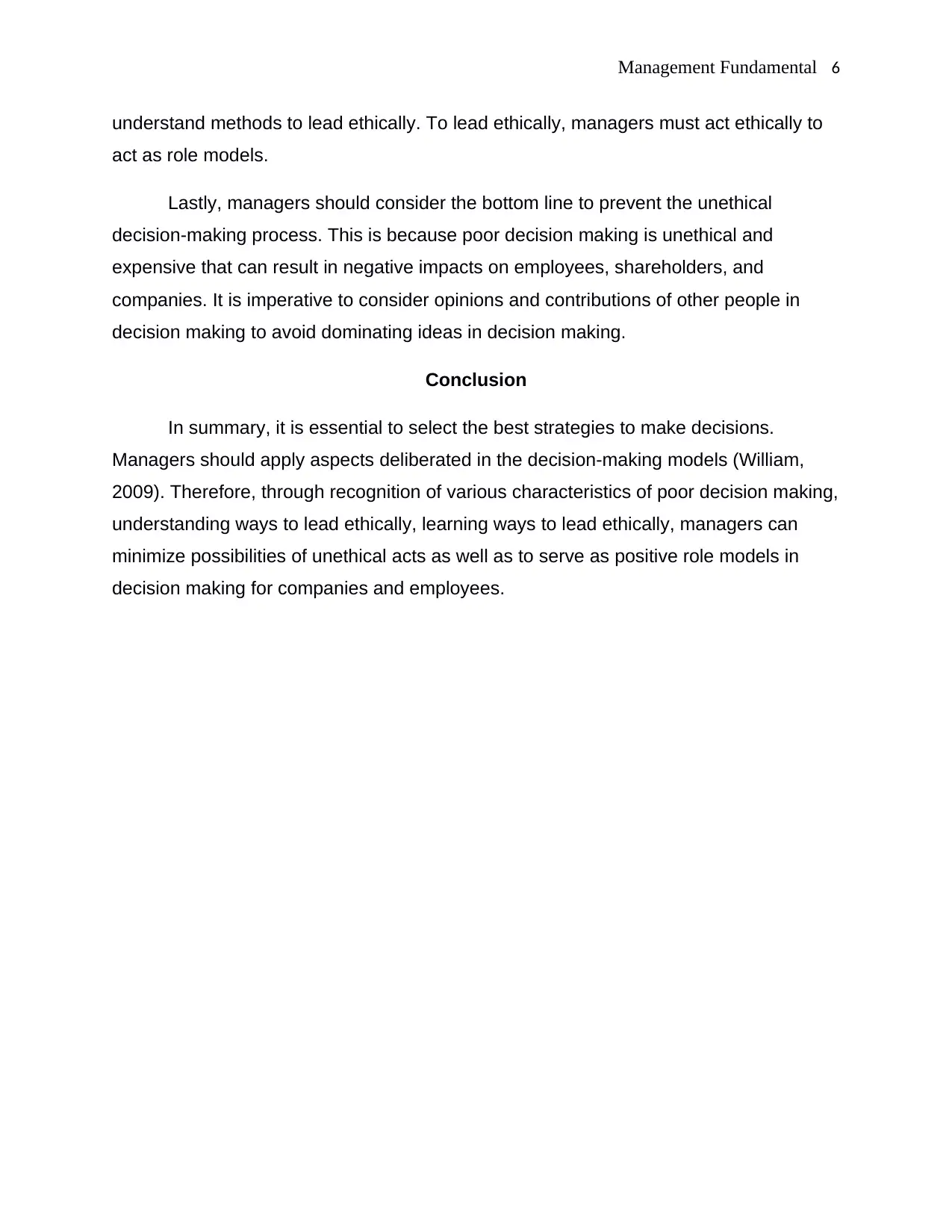
Management Fundamental 6
understand methods to lead ethically. To lead ethically, managers must act ethically to
act as role models.
Lastly, managers should consider the bottom line to prevent the unethical
decision-making process. This is because poor decision making is unethical and
expensive that can result in negative impacts on employees, shareholders, and
companies. It is imperative to consider opinions and contributions of other people in
decision making to avoid dominating ideas in decision making.
Conclusion
In summary, it is essential to select the best strategies to make decisions.
Managers should apply aspects deliberated in the decision-making models (William,
2009). Therefore, through recognition of various characteristics of poor decision making,
understanding ways to lead ethically, learning ways to lead ethically, managers can
minimize possibilities of unethical acts as well as to serve as positive role models in
decision making for companies and employees.
understand methods to lead ethically. To lead ethically, managers must act ethically to
act as role models.
Lastly, managers should consider the bottom line to prevent the unethical
decision-making process. This is because poor decision making is unethical and
expensive that can result in negative impacts on employees, shareholders, and
companies. It is imperative to consider opinions and contributions of other people in
decision making to avoid dominating ideas in decision making.
Conclusion
In summary, it is essential to select the best strategies to make decisions.
Managers should apply aspects deliberated in the decision-making models (William,
2009). Therefore, through recognition of various characteristics of poor decision making,
understanding ways to lead ethically, learning ways to lead ethically, managers can
minimize possibilities of unethical acts as well as to serve as positive role models in
decision making for companies and employees.
⊘ This is a preview!⊘
Do you want full access?
Subscribe today to unlock all pages.

Trusted by 1+ million students worldwide
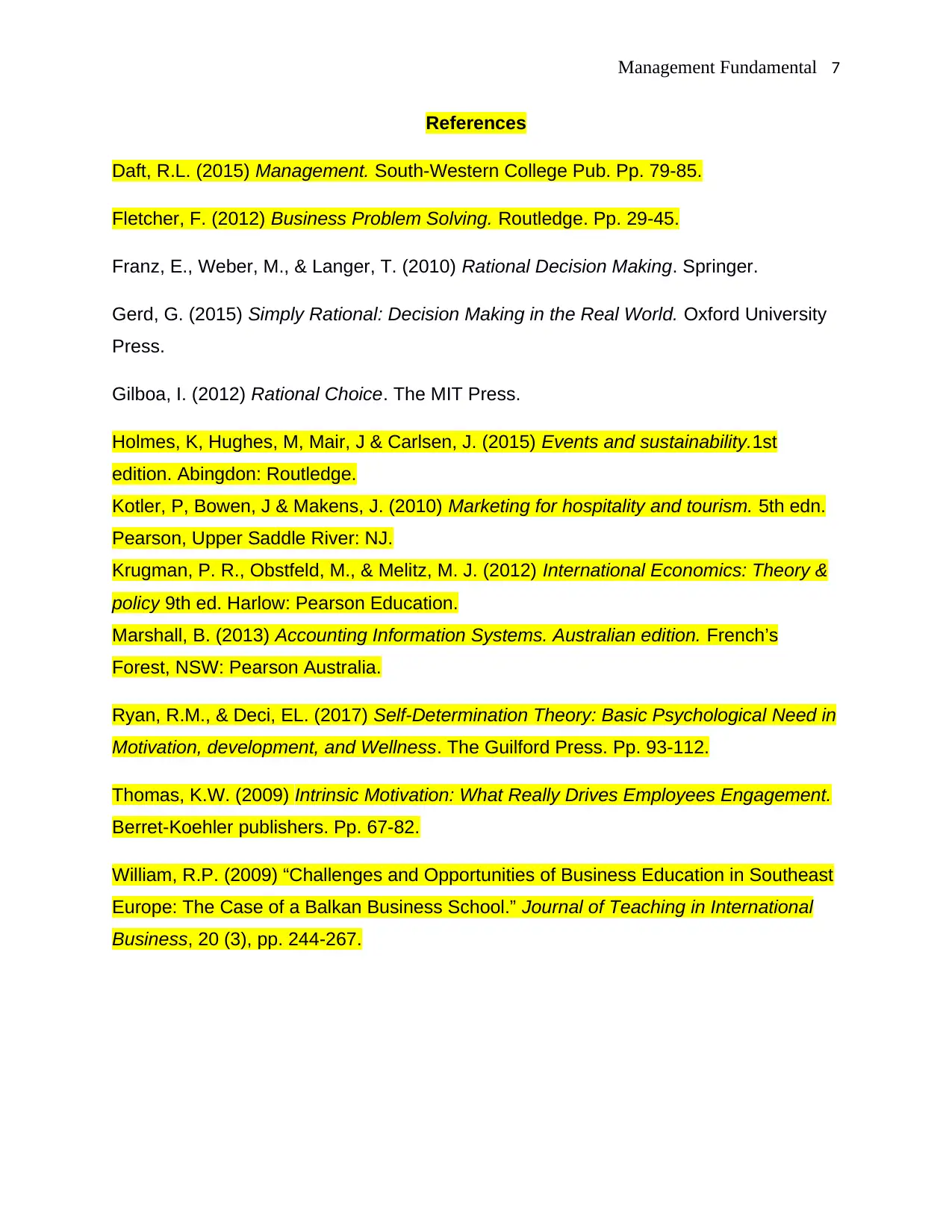
Management Fundamental 7
References
Daft, R.L. (2015) Management. South-Western College Pub. Pp. 79-85.
Fletcher, F. (2012) Business Problem Solving. Routledge. Pp. 29-45.
Franz, E., Weber, M., & Langer, T. (2010) Rational Decision Making. Springer.
Gerd, G. (2015) Simply Rational: Decision Making in the Real World. Oxford University
Press.
Gilboa, I. (2012) Rational Choice. The MIT Press.
Holmes, K, Hughes, M, Mair, J & Carlsen, J. (2015) Events and sustainability.1st
edition. Abingdon: Routledge.
Kotler, P, Bowen, J & Makens, J. (2010) Marketing for hospitality and tourism. 5th edn.
Pearson, Upper Saddle River: NJ.
Krugman, P. R., Obstfeld, M., & Melitz, M. J. (2012) International Economics: Theory &
policy 9th ed. Harlow: Pearson Education.
Marshall, B. (2013) Accounting Information Systems. Australian edition. French’s
Forest, NSW: Pearson Australia.
Ryan, R.M., & Deci, EL. (2017) Self-Determination Theory: Basic Psychological Need in
Motivation, development, and Wellness. The Guilford Press. Pp. 93-112.
Thomas, K.W. (2009) Intrinsic Motivation: What Really Drives Employees Engagement.
Berret-Koehler publishers. Pp. 67-82.
William, R.P. (2009) “Challenges and Opportunities of Business Education in Southeast
Europe: The Case of a Balkan Business School.” Journal of Teaching in International
Business, 20 (3), pp. 244-267.
References
Daft, R.L. (2015) Management. South-Western College Pub. Pp. 79-85.
Fletcher, F. (2012) Business Problem Solving. Routledge. Pp. 29-45.
Franz, E., Weber, M., & Langer, T. (2010) Rational Decision Making. Springer.
Gerd, G. (2015) Simply Rational: Decision Making in the Real World. Oxford University
Press.
Gilboa, I. (2012) Rational Choice. The MIT Press.
Holmes, K, Hughes, M, Mair, J & Carlsen, J. (2015) Events and sustainability.1st
edition. Abingdon: Routledge.
Kotler, P, Bowen, J & Makens, J. (2010) Marketing for hospitality and tourism. 5th edn.
Pearson, Upper Saddle River: NJ.
Krugman, P. R., Obstfeld, M., & Melitz, M. J. (2012) International Economics: Theory &
policy 9th ed. Harlow: Pearson Education.
Marshall, B. (2013) Accounting Information Systems. Australian edition. French’s
Forest, NSW: Pearson Australia.
Ryan, R.M., & Deci, EL. (2017) Self-Determination Theory: Basic Psychological Need in
Motivation, development, and Wellness. The Guilford Press. Pp. 93-112.
Thomas, K.W. (2009) Intrinsic Motivation: What Really Drives Employees Engagement.
Berret-Koehler publishers. Pp. 67-82.
William, R.P. (2009) “Challenges and Opportunities of Business Education in Southeast
Europe: The Case of a Balkan Business School.” Journal of Teaching in International
Business, 20 (3), pp. 244-267.
1 out of 7
Related Documents
Your All-in-One AI-Powered Toolkit for Academic Success.
+13062052269
info@desklib.com
Available 24*7 on WhatsApp / Email
![[object Object]](/_next/static/media/star-bottom.7253800d.svg)
Unlock your academic potential
Copyright © 2020–2026 A2Z Services. All Rights Reserved. Developed and managed by ZUCOL.





